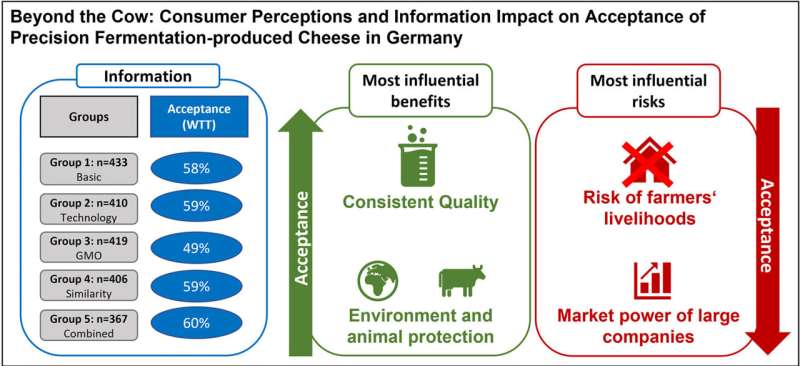This article has been reviewed according to Science X's editorial process and policies. Editors have highlighted the following attributes while ensuring the content's credibility:
fact-checked
proofread
Cheese of the future: Consumers open to animal-free alternatives

In so-called precision fermentation, egg and milk proteins are produced with the help of bacteria, yeasts or other fungi. This results in foods such as milk or cheese with a familiar flavor and texture. Supporters hope that this will lead to more sustainable food production, as nutrient-rich proteins can be produced using fewer resources. But will consumers accept such products?
Researchers at the University of Göttingen have found that a large proportion of German consumers are willing to try and buy cheese produced in this way. The results of the study have been published in the journal Future Foods.
The study, which was conducted in collaboration with LI Food—Landesinitiative Ernährungswirtschaft Niedersachsen and the German Institute of Food Technologies (DIL), is based on a representative online survey with about 2,000 participants.
The researchers analyzed how various aspects of information affect the acceptance of cheese produced in this way. They analyzed the potential opportunities and risks of the technology, including its relation to sustainability, impact on agriculture and product quality.
In general, information has only a minor influence on whether consumers would try or buy cheese from precision fermentation. Only the reference to the technological genetic modification of the microorganisms required for the production process leads to a slightly significantly lower willingness to try the product.
Respondents were also confronted with the potential advantages and disadvantages of this technology. It was found that emphasizing the consistently high quality of the products and advantages in terms of the environment and animal welfare in particular increased the willingness to try such cheese.
The situation is different when consumers are informed about possible risks, for example that farmers could lose their source of income due to the new technology or that large companies could exert too much power on the market. These aspects reduced the willingness to buy and pay for such cheese the most.
"Our study shows that consumers in Germany are open to cheese from precision fermentation if they are informed about the benefits and high quality of the product. However, it is important to design the communication carefully to address concerns about the impact on traditional agriculture," explains first author Dr. Sarah Kühl, Chair for Marketing for Food and Agricultural Products at the University of Göttingen.
Corresponding products are already on the market in the U.S.; authorization in Germany and the European Union is still pending. The technology as such is not new—it is already used in the production of medicines such as insulin.
More information: Sarah Kühl et al, Beyond the cow: Consumer perceptions and information impact on acceptance of precision fermentation-produced cheese in Germany, Future Foods (2024). DOI: 10.1016/j.fufo.2024.100411
Provided by Georg-August-Universität Göttingen





















